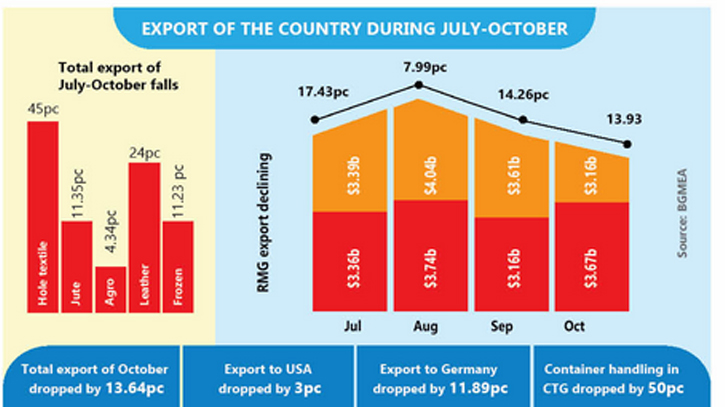
Photo: Messenger
Mounting political tension, exacerbated by continuous strikes and blockades enforced by opposition parties ahead of the 12th national parliament polls, has left garment manufacturers as victims of unsolicited panic and uncertainty.
Amidst the wave of unrest, the movement of garment workers demanding minimum wages erupted, eventually turning violent. In addition to the decline in garment exports, there has also been a decrease in total export earnings, causing concern among garment factory owners.
The garment industry, the main export-earning sector of the country, has been in crisis for quite some time due to the global recession. Retaining export earnings poses a significant challenge for the sector. In this situation, entrepreneurs have called upon political parties to exercise tolerance to prevent the collapse of the import-export trade, emphasising the importance of keeping export-oriented industries out of the movement. Furthermore, top trade organisations are opposing strikes, blockades, and any violent programmes.
Entrepreneurs and businesses expressed concern that political instability, coupled with strikes and blockades in the country, is pushing the national economy towards greater danger.
"We had expected that purchase orders would increase from November. However, the pace of purchase orders has slowed down due to worker dissatisfaction over wages," said Farooq Hasan, President of Bangladesh Garment Manufacturers and Exporters Association (BGMEA).
Executive President of Bangladesh Knitwear Manufacturers and Exporters Association (BKMEA), Muhammad Hatem, told the Daily Messenger, “The strike-blockade programme called by political parties is greatly disrupting the supply chain, affecting the market price of the product and exports.”
In this situation, if products cannot be shipped on time, entrepreneurs will be at risk of cancelling purchase orders. Simultaneously, the higher prices of all commodities, including daily necessities, will impact the common people.
According to BGMEA, garment exports declined by 14 percent in October to $3.16 billion from $3.67 billion, while overall exports decreased by 13.64 percent to $3.75 billion from $4.35 billion. Container handling dropped by 50 percent at the Chottogram port.
Furthermore, exports to the USA declined by 3 percent and Germany by 11.90 percent during July-October 2023-2024FY. Meanwhile, the Israeli-Palestinian war could further destabilise the country's economic activities.
Political unrest has become a major challenge for the sector, accounting for nearly 84 percent of export earnings. Foreign buyers have also reduced their purchases due to reduced demand. If this situation continues, fears for the future will increase.
Managing Director of Bangladesh Apparel Exchange, Mohiuddin Rubel, said, “Any instability, including strikes and blockades, is not good for import and export. We don't expect that. Actual hourly calculation in export. In that case, if one hour of production is not produced, one hour of loss.”
He added, “Until now, the problem of strike-blockade has been managed a lot, although some problems have arisen. What has happened for now can be compensated by overtime or by extending it by a day or two. But more than this is a problem; if it continues continuously, it will be a problem. The shipment will not be on time, the car fare will increase, and the car will also be at risk."
Messenger/Sajib








